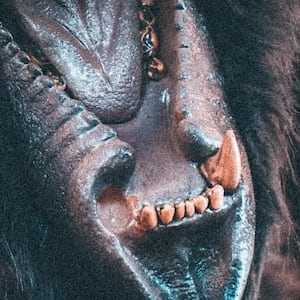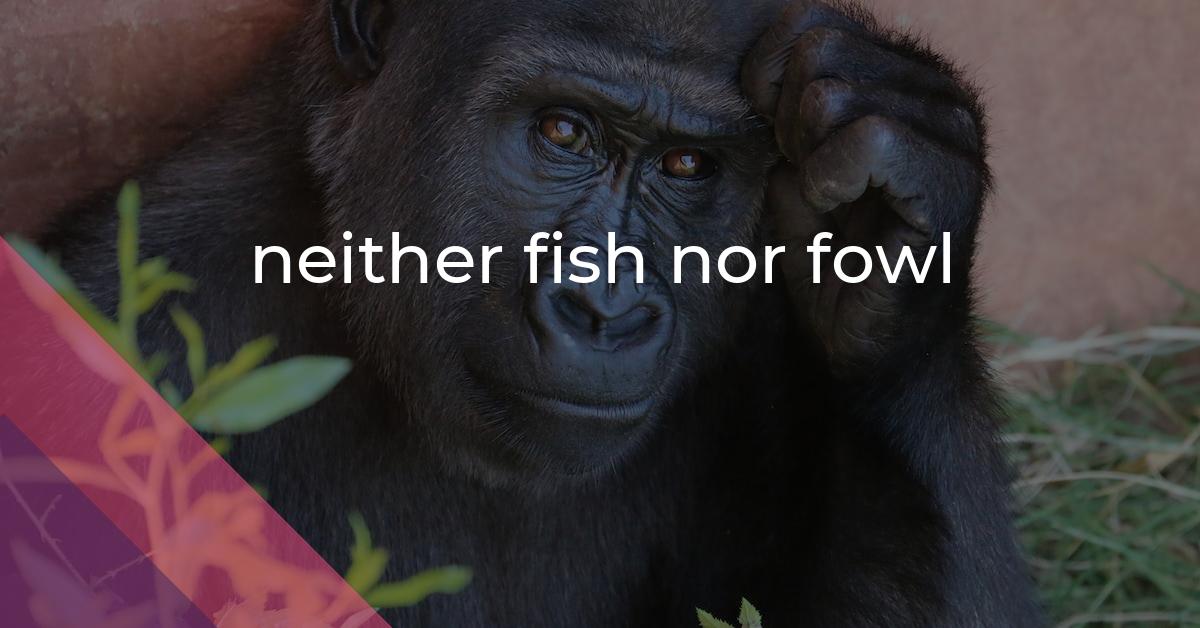neither fish nor fowl: Idiom Meaning and Origin
What does ‘neither fish nor fowl’ mean?
The idiom "neither fish nor fowl" refers to something or someone that doesn't fit into any particular category or group. It suggests a lack of identity or definition, making it difficult to classify or understand.

Idiom Explorer
The idiom "square peg in a round hole" is used to describe a person or thing that is unsuitable or does not fit well in a particular situation or environment.
The idiom "other than" is used to indicate an exception or exclusion, suggesting that something or someone is different from or does not fall into a particular category or condition.
The idiom "other fish in the sea" means that there are plenty of alternatives or options available when one opportunity or relationship fails or ends, suggesting the need to move on and explore other possibilities.
The idiom "or something" is used to suggest an uncertainty or vagueness. It implies that there may be additional information or options available, but the speaker is unsure or does not want to specify them.
The idiom *one and the same* means that two or more things or people are identical or indistinguishable from each other.
The idiom "oil and water" describes two things or people that do not mix well or cannot coexist harmoniously due to fundamental differences or incompatible qualities.
The idiom "of the same stripe" means that two or more people or things are similar or have similar qualities, usually in a negative or undesirable way.
The idiom "odds and ends" refers to various small, miscellaneous things that do not belong to a specific category and are often considered unimportant or insignificant.
The idiom *odd fish* refers to a person who is unusual or eccentric in their behavior or appearance.
The idiom "odd duck" refers to a person who is strange, eccentric, or unconventional compared to others. They stand out in a peculiar way and are often seen as different or unusual.
The Elusive Hybrid
The idiom "neither fish nor fowl" is a popular expression in the English language, often used to describe something or someone that does not fit into any particular category. Its origins can be traced back to the 16th century, and it has since evolved to encompass a broader meaning, capturing the essence of something unconventional or difficult to define.
One possible origin of this idiom is from the world of hunting. In medieval times, a fowl referred to a bird, while fish represented aquatic animals. Therefore, the idiom may have been used to describe a creature or object that did not fall into either of these categories. Perhaps it referred to a strange or mythical creature that couldn't easily fit into established classifications. Over time, the idiom gained popularity and expanded its meaning, encompassing anything or anyone that defies easy categorization.
Another theory suggests that the idiom may have come from the culinary world. In cooking, "neither fish nor fowl" could describe a dish that did not clearly belong to any specific cuisine or style. It may also refer to a dish that combined ingredients or flavors that don't typically go together, resulting in a unique and hard-to-define dish.
The idiom "neither fish nor fowl" has a long history and has become a well-known expression in the English language. It is often used to describe something or someone that does not fit neatly into a specific category. Whether it originated from the world of hunting or cooking, the idiom captures the essence of something unconventional or hard to define. It conveys the idea of not easily falling into established classifications, much like the idiom "neither fish, flesh, nor good red herring."
The idiom "neither fish, flesh, nor good red herring" is another expression that conveys the idea of something or someone that does not fit neatly into established categories. It can be traced back to the 16th century and is often used to describe a person or thing that is neither one thing nor another, or that does not truly belong anywhere. This idiom adds to the understanding of "neither fish nor fowl" by emphasizing the notion of being neither one thing nor another, further highlighting the idea of defying easy classification.
The idiom "neither here nor there" is yet another expression that shares similarities with "neither fish nor fowl." It is often used to describe something that is irrelevant or of little consequence, much like something that does not fit neatly into established categories. This idiom adds another layer to the understanding of "neither fish nor fowl," highlighting the potential insignificance of the subject or object being described.
The idiom "odd fish" is another expression that relates to the concept of "neither fish nor fowl." It is often used to describe someone who is eccentric, peculiar, or unusual. This expression adds to the understanding of "neither fish nor fowl" by emphasizing the unconventional nature of the person or thing being described. It further reinforces the idea of defying easy classification and standing out from the norm.
The idiom "oil and water" also contributes to the understanding of "neither fish nor fowl." It is often used to describe two things or people that are fundamentally incompatible or do not mix well. This expression highlights the idea of contrast and inability to blend, much like something that does not fit neatly into established categories. It further emphasizes the difficulty of finding a place or role for the subject or object being described.
The idiom "fish out of water" is yet another expression that relates to "neither fish nor fowl." It is often used to describe someone who is in an unfamiliar or uncomfortable situation, much like something that does not fit neatly into established categories. This expression adds to the understanding of "neither fish nor fowl" by emphasizing the feeling of being out of place or out of one's element. It further highlights the notion of not quite belonging or fitting into a particular category.
Example usage
Examples of how the idiom "neither fish nor fowl" can be used in a sentence:
- She felt out of place at the party, neither fish nor fowl.
- The new product was marketed as a hybrid, but it failed to appeal to either the traditional customers or the modern ones. It was neither fish nor fowl.
- The painting didn't fit into any specific art category; it was neither fish nor fowl.
More "Expression" idioms



